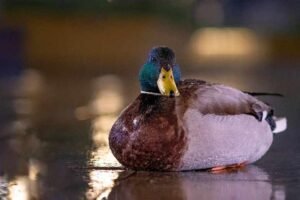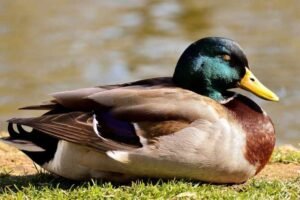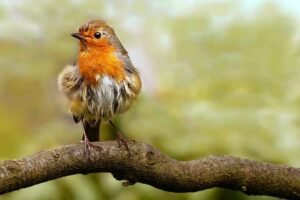Do blackbirds return to the same garden? The likelihood of a blackbird returning to the same garden every year is pretty high. They usually prefer a small garden where they can build their nest and raise their young ones. If blackbirds use your garden as their nest, they are expected to visit again once the freezing winter is over.
Blackbirds are the most common British birds and can be found anywhere all year round. Although these birds are not as protective as Robins, they are fiercely territorial and will fight to protect their kids and territorial boundaries. Their territory is usually your backyard or garden space where they can access sufficient food and raise their hatchlings and fledglings in peace.
Many backyard wildlife lovers believe that the same blackbird visits their garden every year. Therefore, we have decided to research if blackbirds return to the same garden every spring. And the results are pretty awesome!
So, without further ado, let’s get started!
Do Blackbirds return to the same garden?
Blackbirds have a life expectancy of around 3 to 4 years. During their lifespan, they tend to return to the same garden to raise their family. During the first year of their life, male blackbirds establish a territory and tend to spend their whole life in there. This territory establishment is essential for a blackbird as it helps the bird find a pair and build a nest with its mate.
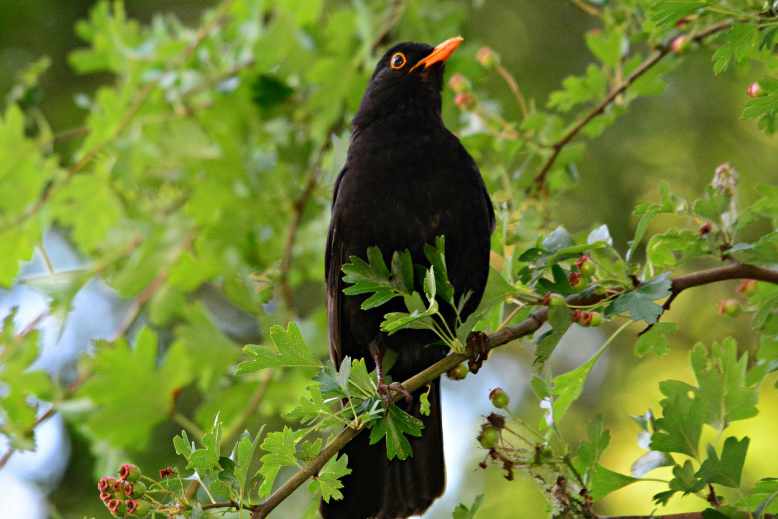
If your garden has some places to (preferably, covered by shrubs and trees) the atmosphere is adequate, and some food is available there, blackbirds will definitely try to make it their habitat.
A blackbird territory size depends on the habitat and can vary. It can be as small as 0.2 ha and as big as 0.6 ha. These birds tend to break down their territorial boundaries when the adult birds molt and the last broods of the season have fledged. Their territorial aggression is pretty low during this period, and birds begin to hunt food outside their territories.
Blackbirds re-establish their territories in the late autumn. So from spring to July, it is not uncommon for you to see them coming back to your garden for nesting purposes. It is also the time when they show protective behaviors against other blackbirds. These encounters aren’t serious, but you can expect some roasting aggression from time to time.
Do Blackbirds use the same nest for each brood?
Blackbirds lay eggs two to three times a year. If the season is good, they can expect a fourth brood.
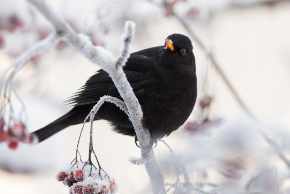
After sight selection, female blackbirds start building their nest. Females prefer small twigs, plant materials, and grass to build their nest, so their nest might not be the most reliable one of all garden birds. Plus, first-time nest builders lack experience. Their nest may be a failure. But they don’t give up and try to rebuild.
Generally, blackbirds prefer a new nest each time. Since they have multiple broods each year, it is not unusual to reuse the same nest. They may prefer saving some time and effort by using the old nest or recycling its pieces for their new house. However, if their nest is disturbed or there is a fear of predator attack, they will abandon it. Once a blackbird abandons a nest, it never returns to it.
Blackbirds can use the same nest for successive broods. Sometimes they take up residence in a nest build by some other bird. But these are sensitive creatures. If someone or something has stolen their chicks, they may not breed in that season. Plus, if they are unsuccessful in raising a brood, they will not use that nesting location again.
Why do blackbirds leave their garden territories?
Blackbirds visit their garden territories during the spring season. But why do they leave in the first place?
Well, when the climate changes and the winter starts to freeze everything out there, blackbirds leave your gardens and head to the countryside. It usually happens when all of their young ones have fledged. They fly to areas where they can protect themselves from extreme weather conditions. Plus, they like to reside in places where food is abundant, and their diet can include more seeds and berries.
As spring rolls around, they make their way back to your gardens. Blackbirds try to make a nest in the same garden if not beaten by one of their young ones from the previous year’s brood. If so, they move on and start nesting in an unoccupied space nearby.
If not destroyed by the freezing winter, some birds may use their previous nest. But mostly they prefer to start from scratch with fresh materials of this year.
Why do black Birds migrate?
Blackbirds are territorial species that like to stay close to their nesting site till they can raise multiple broods successfully. But as the temperature draws down and food becomes harder to find, these birds fly to the countrysides. They stay there until the early spring flowers start to bloom, and then they make their way back to your gardens.
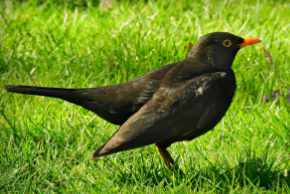
After the breeding season, adult blackbirds hide from predators for a few weeks because of their vulnerability. It is when they lose their old feathers (molt) and wait for the new ones to come. After their new coat comes in, they take a flight from their territory to the countryside, intending to fatten up.
Their migration towards the countryside provides them with berries and other nutritious crops. The sole reason behind their winter migration is to survive the cold with peace. Blackbirds also abandon their territory if you disturb their nest. We know you are not the predator, but does the bird knows too?
Probably, No!
Why do black Birds abandon their nests?
Blackbirds have a reputation for leaving their nest behind once and for all. If the little birdie has said goodbye to a nest, it may never return to the same garden, and you will not be able to see the same pair hoping and jumping in your garden again.
Blackbirds (or any bird without exception) leave your garden and their nesting site for two main reasons:
- There is a risk to their safety, and they feel threatened
- They have successfully raised their fledglings, and there is no further use of the nest.
It is interesting to know that birds build a nest to raise their little ones. They don’t use it as a living space. That’s why you only see female blackbirds searching for nesting materials in your garden during a certain time of the year. Blackbirds can also decide to nest elsewhere if they feel endangered by someone or something (human or animal).
Blackbirds are known for making more than one nest. They build multiple nests in different locations to test which one is the safest to lay eggs.
What are the threats to a Blackbird nest?
Nesting blackbirds perceive a lot of things as a safety hazard for their kids. If they are nesting in your garden, they may consider you and your pets their main predators. Too much human or pet cat interaction can make them change their nesting location.
Why do birds abandon their nests with eggs?
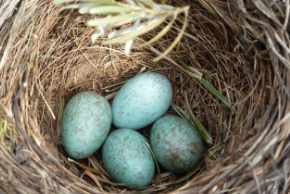
So, here is the dark twist of life. Animals need to hunt to stay alive. Their existence revolves around four major things,
- Food
- Water
- Survival
- Reproduction
Strong animals/birds prey on weaker ones to exist. So, when there is a predator, the blackbirds have to make a choice. They can either fight and protect their eggs and hatchlings or save themselves.
Sadly, female blackbirds have to abandon their nest with eggs so they can survive and reproduce again. If the birds live, they can continue to raise many hatchlings over their lifetime.
Following are some of the possible reasons you spot a nest in your garden with eggs in it and no parents around.
- They are around for food and will return soon.
Mama blackbird has to eat too! Parent birds periodically leave their nest to find food for themselves. During the incubation period, female birds can take up to 30 minutes to search for food. However, during the egg-laying period, birds are not required to spend time in their nest at all!
Some birds don’t incubate their eggs until they are free from their egg-laying period. They use this strategy, so the little ones don’t develop at different rates. And the parents can easily take care of them. During this time, they don’t need to sit on the nest. So next time, if you notice a nest with eggs in it and no parents in sight, don’t panic as they may be around waiting for you to leave.
- A predator may have killed the parents.
Blackbirds have many natural predators, including but not limited to cats, large birds, foxes, hawks, and raccoons. Though unfortunate, some predators may kill the parent blackbird.
In some cases, if the female bird is killed, males try to incubate the eggs. But most of the time, male blackbirds cannot incubate, but they do help gather food. If male blackbirds are killed, females cannot handle the workload of incubation and food gathering alone, so they give up their eggs.
- They are scared away by predators.
Blackbirds usually don’t leave their nest due to a momentary spook by your domestic cat and are likely to return soon.
However, if your interactions are overly harassing, they may give up your garden and desert their nest. They may also say goodbye to your garden if other animals and birds are ready to raid their nest. Plus, if your kids are too curious and get too close to their nest, they will leave for good. Raising a hatchling is a lot of work! These birds aren’t going to waste their energy if the nest is not going to stay, and chances of survival for their young ones are low.
- Insect infestation
If your garden is infested with flies or other insects, these insects will surely infest the bird’s nest. This can make it unbearable for the parents to sit on the eggs and incubate. Parent blackbirds will judge that the chances of survival for the hatchling are low, so they will not waste their energy incubating an egg that won’t survive.
How many times a year do blackbirds nest?
Blackbirds can raise 3 to 4 successful broods in one season. Each brood has three to 5 eggs which the mother blackbirds incubate. Mothers are brown, so they blend in with their environment.
As mentioned above, blackbirds may build a new nest for each brood. However, some of them prefer reusing their existing nesting site. Females start to build a new nest, and they continue to do it till summer.
It takes a brood up to two weeks to hatch. Parents take care of their hatchlings for a couple of weeks before they leave the nest. One successful brood can take a month from start to end. After the hatching is strong enough to leave the nest, the parent blackbirds start to breed again.
How to tell if a mother bird has abandoned her nest?
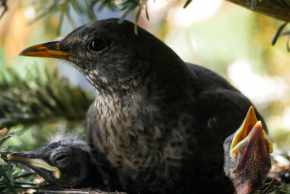
So you have noticed a nest in your garden, but the mother is nowhere to be found. Here is what you should and should not do:
What you should do
- Observe the nest for at least one or two days. It is possible that the mother is looking for food or more nesting materials and will be back soon.
- Avoid getting too close to the nesting site. Give the bird a sense of security.
- Your pets may spook them. Try to keep them inside.
- If you were watching the nesting site for a while and have some pretty good reasons to believe that the nest is abandoned, contact a wildlife rehabilitator and seek their advice.
Things you shouldn’t do
- Don’t try to rescue the eggs. Never move the eggs to another location. Birds have a strong instinct to stay with their eggs. Unless they are extremely harassed, they will try to return to their nest.
- Don’t try to make a nest strong. The birds may not recognize or accept the new changes.
- Eggs are easy to damage. Never try to pick up or touch them.
Wrapping up
Blackbirds are our regular garden visitors. Depending on the temperature, they leave their territory to visit the countryside. But as soon as the weather warms up, they return to our gardens. These birds tend to nest in a secure area away from any human or animal interaction. It’s better to leave the nest alone so the visiting birds can successfully raise their young ones.

